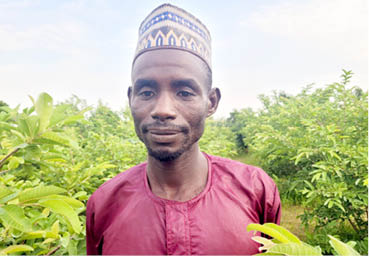Gombe farmer earns N2.5m annually from guava
Malam Ibrahim Aliyu, a farmer from Bula community in Akko Local Government Area of Gombe State, has reported making over N2.5 million from guava farming in a single year. In an interview conducted on his farm, Aliyu described guava farming as a highly profitable venture that he believes more young people should explore to improve […]

gombe farmer
Malam Ibrahim Aliyu, a farmer from Bula community in Akko Local Government Area of Gombe State, has reported making over N2.5 million from guava farming in a single year.
In an interview conducted on his farm, Aliyu described guava farming as a highly profitable venture that he believes more young people should explore to improve their livelihoods and gain financial independence.
As the chairman of the Guava Farmers Association in Bula, Aliyu said his orchard, consisting of over 3,700 guava trees, generated significant income last year. Alongside guava, he also grows other crops such as maize, sorghum and beans.
“In 2023 alone, I earned N2.5 million solely from guava farming, and I’m not the only one benefiting from it,” Aliyu said, adding that many young people in the community have also taken up guava farming and are making a decent living from it.
- Abducted Kebbi district head dies in captivity, 8 others rescued
- Cameroon’s 91-year-old President Biya in good health, gov’t says
He further explained that beyond the financial benefits, guava farming contributes to environmental protection by supporting government efforts at combatting desertification and climate change. “Planting guava trees is our way of contributing to environmental sustainability,” he also said.
Aliyu noted that guava farming has gained widespread popularity in Bula, with more than 120 farmers establishing commercial guava orchards. The fruit from these orchards is transported to major markets in Bauchi, Yobe, Adamawa, and various parts of Gombe State, providing a stable income for local farmers.
He emphasised that guava farming is playing a key role in reducing poverty and unemployment among young people in the community. Aliyu urged more youths to take up guava farming, stressing that it requires minimal investment and effort while offering high returns.
“There are certain species of guava that mature quickly and produce sweet, marketable fruit, making it an ideal business for young entrepreneurs,” he said.
Despite the success, Aliyu expressed concerns about the lack of agricultural extension services in the area, which could help farmers tackle technical challenges and boost productivity.
He appealed to the state government to provide technical support to assist more farmers, especially young ones, to scale up their guava farming operations and improve their yields.
